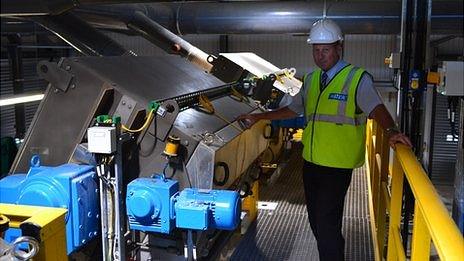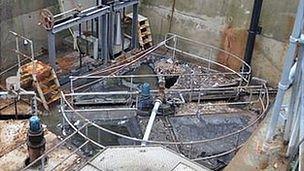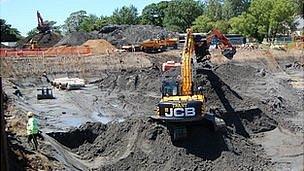Guernsey sewage 'must be pumped into sea'
- Published

Andrew Redhead said the island was blessed with a strong tidal range and flow
Pumping untreated sewage into the sea is an "appropriate" method of disposal, Guernsey Water has said.
A £11m plant at Belle Greve, which removes the non-biodegradable material from waste water, has started working.
Andrew Redhead, director of water services, said Guernsey's unique tidal flow and lack of heavy industry negated the need for full sewage treatment.
Andy Cummins, from campaign group Surfers Against Sewage, said treatment was the only long-term solution.
He said he welcomed the move to remove items from the waste, but added more needed to be done to protect the environment and those who used the seas.
'Simply chopped up'
The level of treatment offered by the plant was agreed by the States after a specially-commissioned £200,000 report, external found a full treatment works, which would cost about £100m over 25 years, would provide no environment benefit above that brought by the new plant.
UK firm Metoc concluded while the treatment did not "strictly conform" with the European Union's Urban Waste Water Treatment Directive it protected the surrounding water from pollution, did not damage bathing water quality and did no harm to shellfish or other animals that dwell at the bottom of the sea.
The directive suggests primary treatment should be a minimum for a population the size of Guernsey. The company found all the studies carried out "would suggest that there is no adverse affect from the Belle Greve discharge".

The old plant (pictured) was open to the air so the sewage could be smelt from nearby properties
The plant began operating last month and will be officially opened on 2 October.
Andrew Redhead said the advantage of the new plant was a screening process that removed items bigger than 6mm (0.2mm), which were disposed of in landfill rather than being "simply chopped up and discharged into the Little Russell".
He said: "We don't have large chemical processes, we don't have electroplating, we don't have heavy civil engineering, we don't have chrome, nickel, lead, cadmium and all of these other sort of hazardous chemicals that go into sewage
"Ours is principally domestic sewage so and therefore the natural environment of the wave action and the sea is quite capable of treating and dealing with it, provided we take out the non-biodegradable material."
Eliminating leakage
Mr Redhead said: "It's important we have the best form of treatment we can that is appropriate for Guernsey, we are particularly well blessed with the flow in the Russell, which is almost unique in Europe both in terms of tidal range and tidal flow.

A four million litre tank to hold excess water was built next to the plant and covered over
"It enables oxygen to be mixed in with the water, the ultraviolet light of the sun is sterilising and clearing the material which is put out there.
"So provided whatever we put in the sea is capable of being finished off by mother nature then to my mind there is absolutely no problem whatsoever with the form of treatment we're currently giving the waste water."
Guernsey Water, which officially took over responsibility for waste water in 2012, is expecting to spend up to £80m over the next 10 years on eliminating leakage in the sewage system.
Mr Redhead said leakage in coastal areas was more of a possible threat to bathing water quality than the outfall in the Little Russell.
The States has also been asked to approve a £15m spend on replacing the long sea outfall, which is due to be discussed alongside funding other capital projects in the government's September meeting.
- Published2 September 2012
- Published21 June 2012
- Published14 March 2012
- Published10 February 2012
- Published8 February 2012